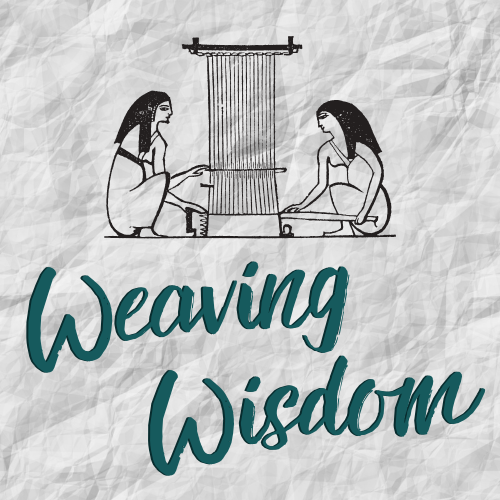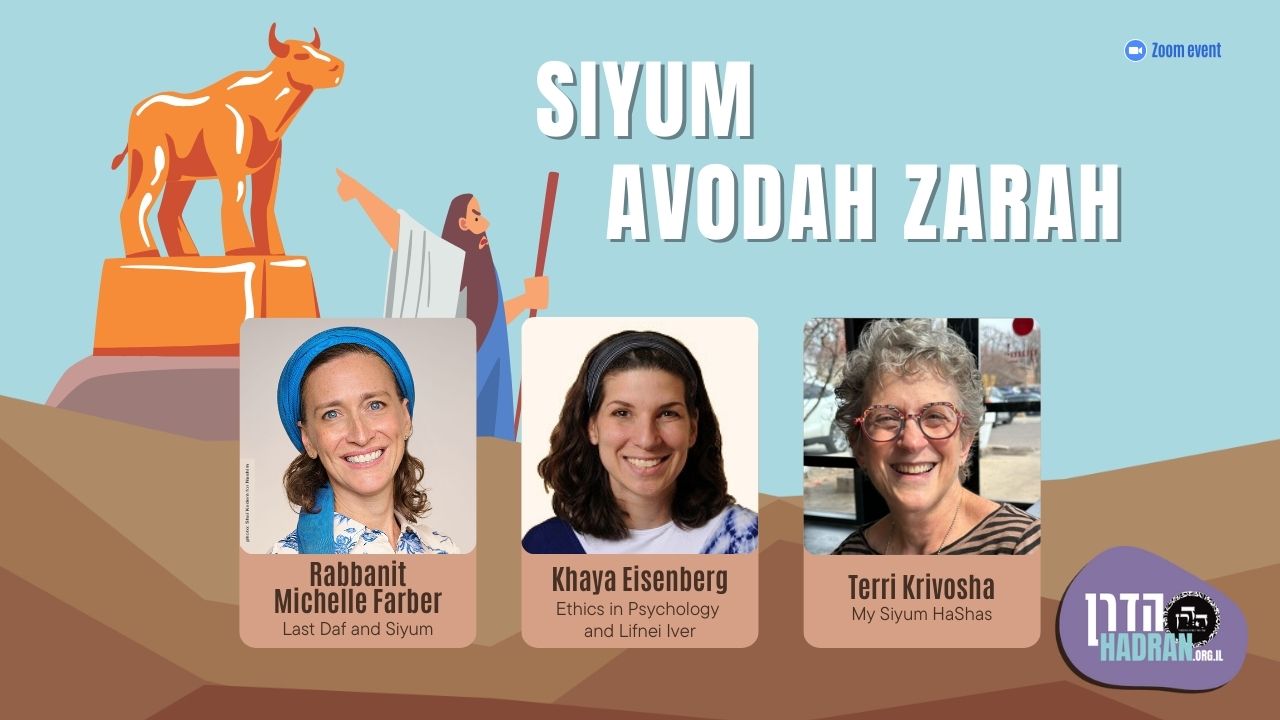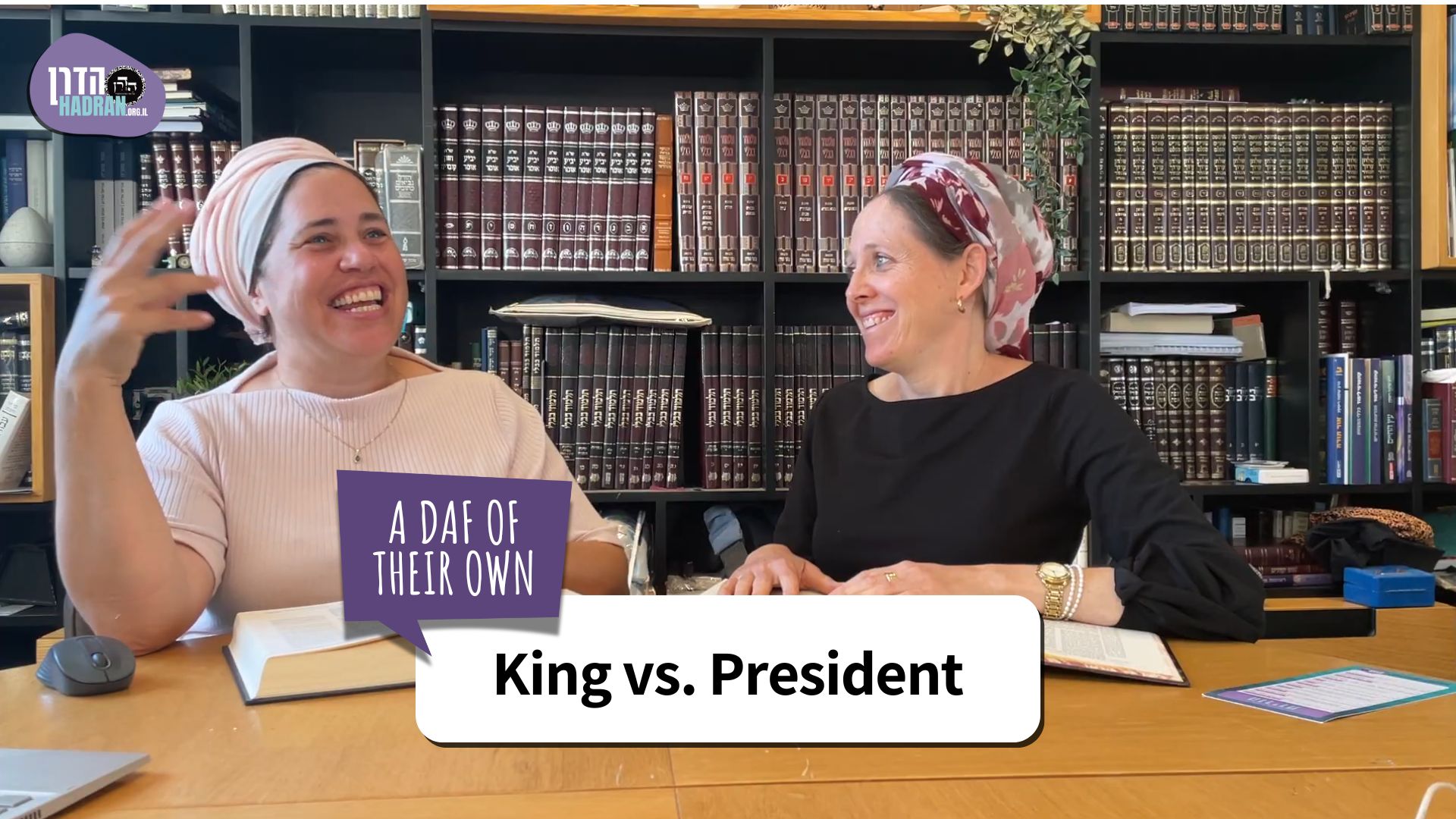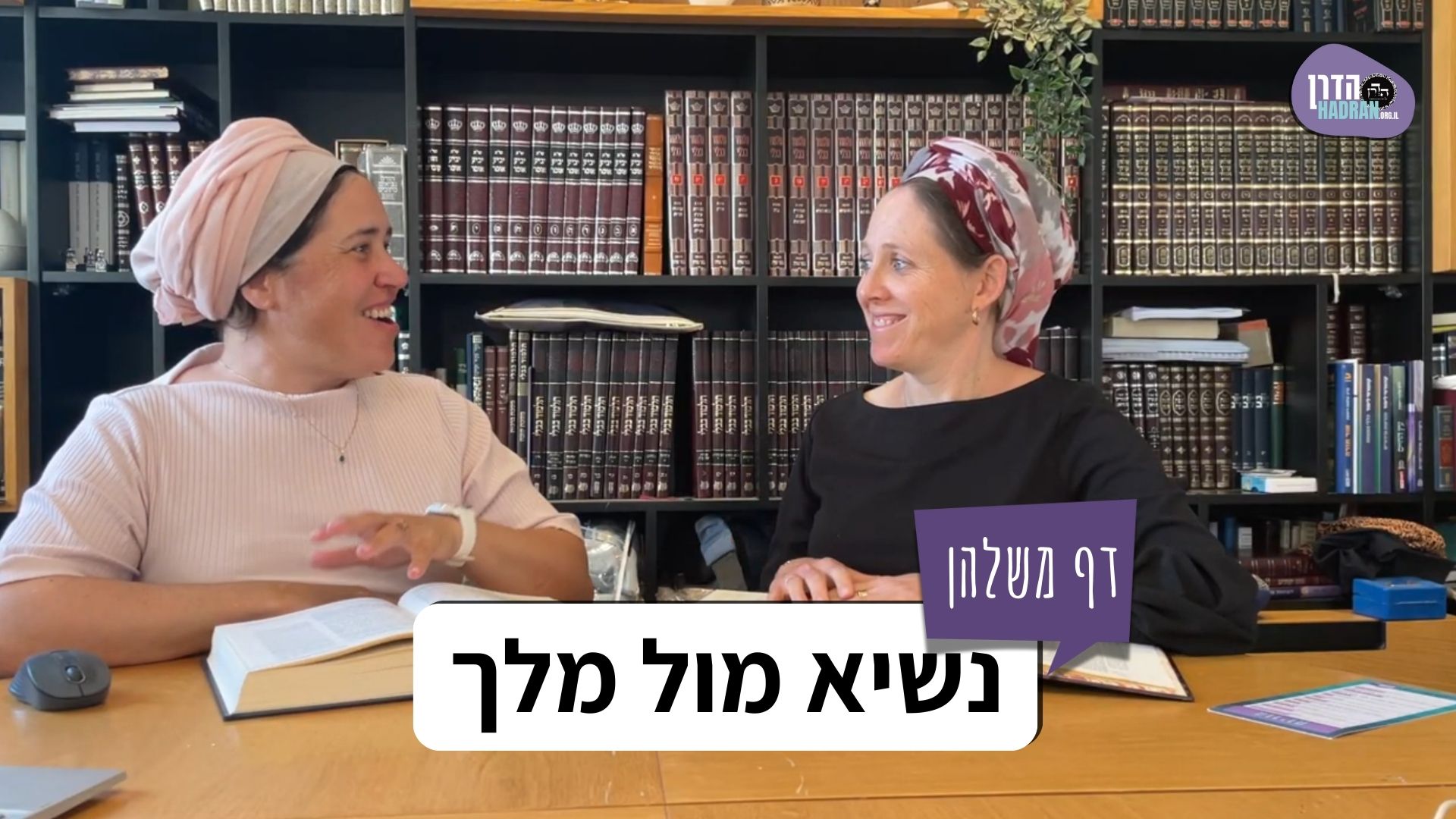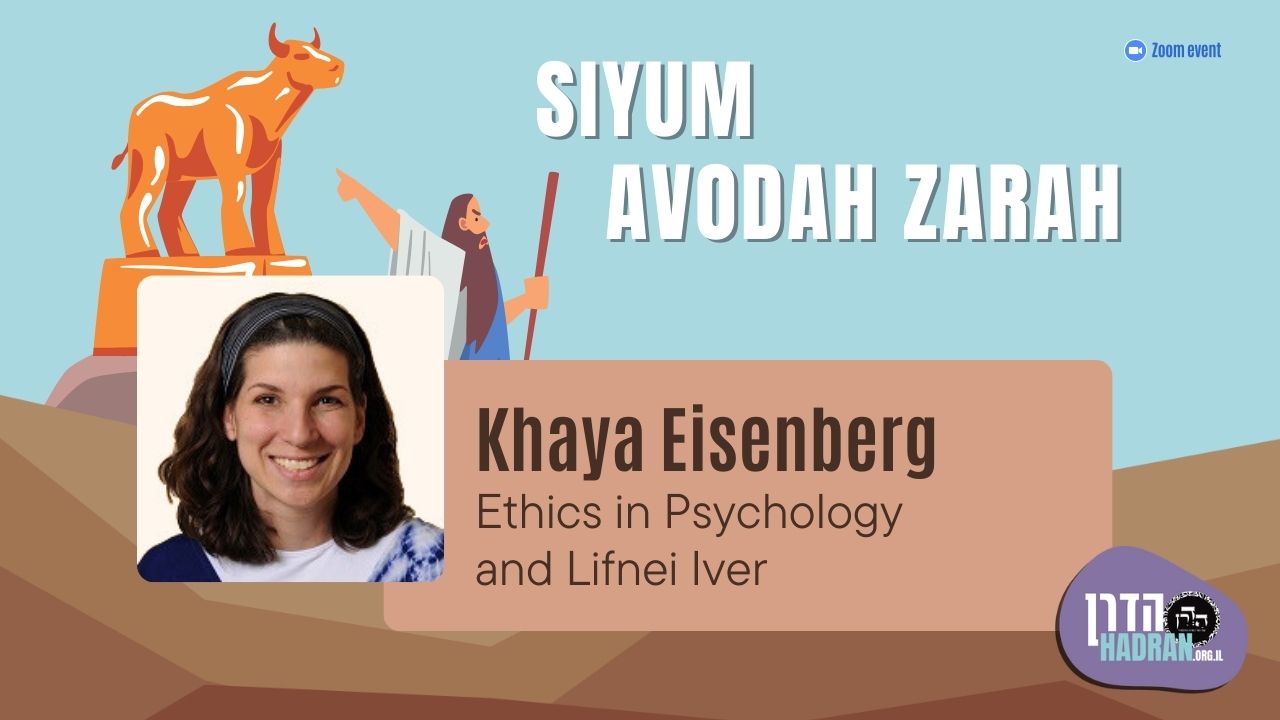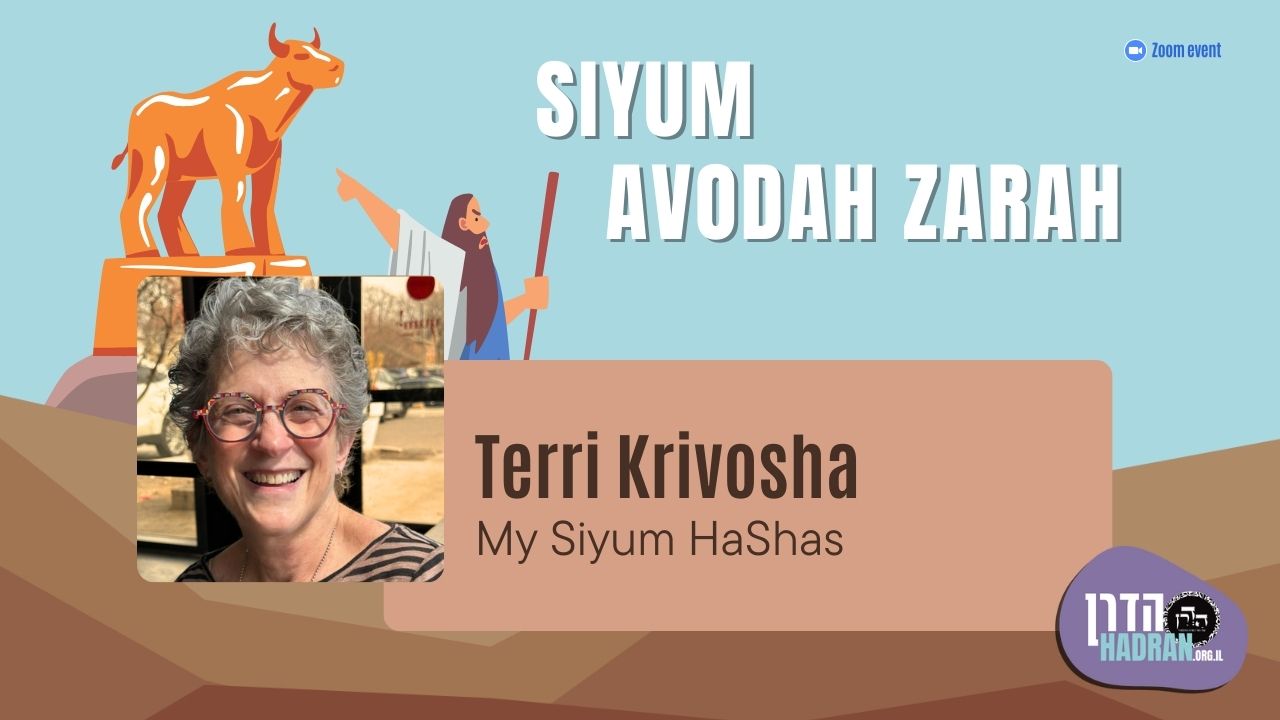Yevamot 111
תִּיתֵּיב גַּבֵּיהּ מִמָּה נַפְשָׁךְ: אִי קְנוּיָה הִיא — הָא קְנוּיָה הִיא, וְאִי לָאו קְנוּיָה הִיא — הָא נׇכְרִית בְּעָלְמָא הִיא.
Let her stay with him, as she is permitted whichever way you look at it: If she is acquired, then she is fully acquired; and if she is not acquired at all, then she is merely an unrelated woman. If the marriage to the deceased brother was not a true marriage, there is no reason for her to be forbidden to him.
וְכִי תֵּימָא, קְטַנָּה אַמַּאי תַּמְתִּין עַד שֶׁתַּגְדִּיל וְתַחְלוֹץ? תִּיתֵּיב גַּבֵּיהּ, אִי קְנוּיָה הִיא — הָא קְנוּיָה הִיא, אִי לָאו קְנוּיָה הִיא — נוּכְרִיתָא בְּעָלְמָא הִיא! אִם כֵּן, חֵרֶשֶׁת בְּמָה תִּיפּוֹק.
And if you would say that the same question could be asked if you claim that it is the minor whose acquisition is uncertain: Why should she wait until she reaches majority and performs ḥalitza? Let her stay with him: If she is acquired, then she is fully acquired; and if she is not acquired at all, then she is merely an unrelated woman. However, you cannot say that because, if that is so, how shall the deaf-mute be released? As a deaf-mute, she cannot perform ḥalitza, and he cannot consummate the levirate marriage with her since the minor may be considered to be acquired by him, in which case the deaf-mute would be disqualified as the rival wife of his yevama. Rav’s suggestion was meant to find a way for both of them to be able to remarry, and that is only possible if the minor and deaf-mute’s statuses are as Rav Ḥisda argues.
אָמַר רַב שֵׁשֶׁת: הָכִי נָמֵי מִיסְתַּבְּרָא, כִּדְקָא מְתָרֵץ רַב חִסְדָּא אַלִּיבָּא דְרַב,
Rav Sheshet said: Indeed, this too stands to reason, i.e., only the way that Rav Ḥisda explained the halakha in accordance with the opinion of Rav is reasonable.
דְּתַנְיָא: שְׁנֵי אַחִין נְשׂוּאִין שְׁתֵּי אֲחָיוֹת יְתוֹמוֹת, קְטַנָּה וְחֵרֶשֶׁת, מֵת בַּעְלָהּ שֶׁל קְטַנָּה — חֵרֶשֶׁת יוֹצְאָה בְּגֵט, וּקְטַנָּה תַּמְתִּין עַד שֶׁתַּגְדִּיל, וְתַחְלוֹץ.
As it is taught in a baraita about the following case: Two brothers married two orphaned sisters, one of them a minor and one of them a deaf-mute. If the husband of the minor dies and she happens before the husband of the deaf-mute for levirate marriage, the deaf-mute must be released by means of a bill of divorce due to her sister’s levirate bond, and the minor must wait until she reaches majority and perform ḥalitza.
מֵת בַּעְלָהּ שֶׁל חֵרֶשֶׁת — קְטַנָּה יוֹצְאָה בְּגֵט, וְחֵרֶשֶׁת אֲסוּרָה לְעוֹלָם. וְאִם בָּא עַל הַחֵרֶשֶׁת — נוֹתֵן לָהּ גֵּט, וְהוּתְּרָה.
If the deaf-mute’s husband dies, the minor must be released by means of a bill of divorce and the deaf-mute is forbidden forever. He must divorce the minor because of the levirate bond with her sister. He may not consummate the levirate marriage with the deaf-mute because she is his ex-wife’s sister; and he cannot perform ḥalitza with her, because she is not capable of performing ḥalitza. And if he transgresses and consummates the levirate marriage with the deaf-mute, he gives her a bill of divorce afterward, and she is thereby released.
אִי אָמְרַתְּ בִּשְׁלָמָא חֵרֶשֶׁת קְנוּיָה וּמְשׁוּיֶּירֶת, קְטַנָּה קְנוּיָה וְאֵינָהּ קְנוּיָה — מִשּׁוּם הָכִי דְּכִי בָּא עַל הַחֵרֶשֶׁת נוֹתֵן לָהּ גֵּט וְהוּתְּרָה, דְּאָמְרַתְּ מִמָּה נַפְשָׁךְ: אִי קְטַנָּה קְנוּיָה הִיא — הָא נָפְקָא מִשּׁוּם אֲחוֹת אִשָּׁה, אִי לָאו קְנוּיָה — שַׁפִּיר מְיַבֵּם.
Granted, this argument works if you say that the deaf-mute is partially acquired, and the minor is either acquired or not acquired; it is due to that reason that if he transgresses and consummates the levirate marriage with the deaf-mute, he gives her a bill of divorce and she is released. You would say she is released whichever way you look at it: If the minor is fully acquired by her husband, then the deaf-mute is released due to her status as the sister of his wife, who is a forbidden relative and as such is entirely exempt from levirate marriage. And if the minor is not acquired at all, then he may rightly consummate the levirate marriage and afterward divorce her.
אֶלָּא אִי אָמְרַתְּ חֵרֶשֶׁת קְנוּיָה וְאֵינָהּ קְנוּיָה, קְטַנָּה קְנוּיָה וּמְשׁוּיֶּירֶת, כִּי בָא עַל חֵרֶשֶׁת אַמַּאי נוֹתֵן גֵּט וְהוּתְּרָה? הָוְיָא לֵיהּ בִּיאָה פְּסוּלָה — וּבִיאָה פְּסוּלָה לָא פָּטְרָה.
But if you say that the deaf-mute is either acquired or not acquired, i.e., the status of a marriage with a deaf-mute is uncertain, while the minor is partially acquired, then when he transgresses and has intercourse with the deaf-mute, why should he give her a bill of divorce and she thereby be released? It is an invalid sexual act, as the minor is partially acquired, which disqualifies her sister from levirate marriage. And an invalid sexual act does not exempt her, i.e., does not constitute full consummation of the levirate marriage, making it possible for him to divorce her. She still requires ḥalitza, and a deaf-mute cannot perform ḥalitza. Therefore it must be, as Rav Ḥisda suggested, that the deaf-mute is partially acquired while it is uncertain whether the minor is acquired or not.
הָא מַנִּי — רַבִּי נְחֶמְיָה הִיא, דְּאָמַר: בִּיאָה פְּסוּלָה, פּוֹטֶרֶת מֵחֲלִיצָה.
The Gemara rejects the conclusion that the baraita provides evidence for Rav Ḥisda’s explanation, as it is possible to say: In accordance with whose opinion is this baraita? It is in accordance with the opinion of Rabbi Neḥemya, who said: An invalid sexual act also exempts a woman from ḥalitza.
אִי רַבִּי נְחֶמְיָה, אֵימָא סֵיפָא: מִי שֶׁהָיָה נָשׂוּי שְׁתֵּי יְתוֹמוֹת, קְטַנָּה וְחֵרֶשֶׁת, וּמֵת. בָּא יָבָם עַל הַקְּטַנָּה, וְחָזַר וּבָא עַל הַחֵרֶשֶׁת, אוֹ שֶׁבָּא אָחִיו עַל הַחֵרֶשֶׁת — נֶאֶסְרוּ שְׁתֵּיהֶן עָלָיו. כֵּיצַד תַּקָּנָתָן? חֵרֶשֶׁת יוֹצֵאת בְּגֵט, וּקְטַנָּה תַּמְתִּין עַד שֶׁתַּגְדִּיל, וְתַחְלוֹץ.
The Gemara asks: If one accepts the suggestion that this baraita is in accordance with the opinion of Rabbi Neḥemya, say the latter clause of this same baraita: Consider the case of one who was married to two orphans, a minor and a deaf-mute, and he died. If the yavam had intercourse with the minor and then had intercourse with the deaf-mute, or if one of his brothers had intercourse with the deaf-mute after the first brother engaged in intercourse with the minor, they are both forbidden to the first brother. How can their situation be rectified? The deaf-mute must be released with a bill of divorce, and the minor must wait until she reaches majority and then perform ḥalitza.
אִי אָמְרַתְּ בִּשְׁלָמָא חֵרֶשֶׁת קְנוּיָה וּמְשׁוּיֶּירֶת, קְטַנָּה קְנוּיָה וְאֵינָהּ קְנוּיָה, וְרַבָּנַן הִיא — מִשּׁוּם הָכִי תַּמְתִּין עַד שֶׁתַּגְדִּיל, וְתַחְלוֹץ — דְּדִלְמָא קָדֵים וּבָעֵיל חֵרֶשֶׁת בְּרֵישָׁא, וְהָוְיָא לֵיהּ בִּיאָה דִקְטַנָּה בִּיאָה פְּסוּלָה.
Granted, this halakha makes sense if you say that a deaf-mute is partially acquired, meaning that she was never fully acquired in the first place; that a minor is either acquired or not acquired; and that the baraita is in accordance with the opinion of the Rabbis who state that an invalid sexual act does not exempt a woman from ḥalitza. For these reasons, the minor must wait until she reaches majority and then perform ḥalitza. The Sages decreed that she must perform ḥalitza no matter what, as perhaps he may precipitately have intercourse with the deaf-mute first, so that the subsequent intercourse with the minor is considered an invalid sexual act, because he is already partially married to her rival wife. However, since the deaf-mute is only partially acquired, her levirate marriage does not exempt the minor and the minor still must perform ḥalitza.
אֶלָּא אִי אָמְרַתְּ רַבִּי נְחֶמְיָה, הָא אָמַר בִּיאָה פְּסוּלָה פָּטְרָה!
But if you say it is in accordance with the opinion of Rabbi Neḥemya, and also that the status of a deaf-mute’s marriage is uncertain while the status of the minor is that she is partially acquired, there is no explanation why the minor must perform ḥalitza when she reaches majority, as he said that an invalid sexual act exempts her.
אֶלָּא שְׁמַע מִינַּהּ רַבָּנַן הִיא. שְׁמַע מִינַּהּ.
Rather, conclude from this reasoning that this baraita is in accordance with the opinion of the Rabbis. The Gemara concludes: Learn from it.
אָמַר רַב אָשֵׁי: מֵרֵישָׁא נָמֵי שְׁמַע מִינַּהּ דְּרַבָּנַן הִיא, דְּקָתָנֵי: אִם בָּא עַל הַחֵרֶשֶׁת — נוֹתֵן לָהּ גֵּט, וְהוּתְּרָה, וְלָא קָתָנֵי: אִם בָּא עַל הַקְּטַנָּה — נוֹתֵן לָהּ גֵּט וְהוּתְּרָה.
Rav Ashi said: One may learn also from the first clause of the baraita that it is in accordance with the opinion of the Rabbis, as it teaches: If he transgresses and consummates the levirate marriage with the sister, who is a deaf-mute, he gives her a bill of divorce afterward, and she is thereby released. And it does not teach: If he consummates the levirate marriage with the minor, he gives her a bill of divorce and she is released. This is presumably because consummation of levirate marriage with the minor is an invalid sexual act, as her deaf-mute sister is partially married to the yavam. Even if he does engage in intercourse with her, she will still require ḥalitza.
אִי מִשּׁוּם הָא לָא אִירְיָא: חֵרֶשֶׁת, דְּלֵית לַהּ תַּקַּנְתָּא דְהֶיתֵּירָא — קָתָנֵי תַּקַּנְתָּא דְאִיסּוּרָא. קְטַנָּה, דְּאִית לַהּ תַּקַּנְתָּא דְהֶיתֵּירָא — לָא תָּנֵי תַּקַּנְתָּא דְאִיסּוּרָא.
The Gemara rejects this argument: If it is due to that reason, there is no conclusive argument, as one may say that for the deaf-mute, whose situation has no rectification that is permitted because she cannot perform ḥalitza, the baraita teaches a prohibited rectification; but for the minor, whose situation has a permitted rectification, in that she can perform ḥalitza after she reaches majority, the baraita does not teach a prohibited rectification.
מַתְנִי׳ מִי שֶׁהָיָה נָשׂוּי לִשְׁתֵּי יְתוֹמוֹת קְטַנּוֹת, וּמֵת, וּבָא יָבָם עַל הָרִאשׁוֹנָה, וְחָזַר וּבָא עַל הַשְּׁנִיָּה, אוֹ שֶׁבָּא אָחִיו עַל הַשְּׁנִיָּה —
MISHNA: If a man was married to two minor orphans and he died, and a yavam engaged in intercourse with the first of them to consummate the levirate marriage, and then engaged in intercourse with the second, or if his brother who is also their yavam engaged in intercourse with the second,
לֹא פָּסַל אֶת הָרִאשׁוֹנָה, וְכֵן שְׁתֵּי חֵרְשׁוֹת.
the yavam or his brother did not disqualify the first girl from staying married to him, as her levirate marriage was consummated. Likewise, if the two wives were two female deaf-mutes, the first wife may remain married to the yavam. Intercourse with the second wife, though prohibited, has no effect: If the marriage was of uncertain status, then either the levirate marriage was concluded when he engaged in intercourse with the first, or neither wife was really married to the first husband, and they are therefore not rival wives. If the initial marriage was partial, then since both wives have the same standing, the levirate marriage with the first wife fully realizes whatever degree of levirate marriage is available.
קְטַנָּה וְחֵרֶשֶׁת. בָּא יָבָם עַל הַקְּטַנָּה, וְחָזַר וּבָא עַל הַחֵרֶשֶׁת, אוֹ שֶׁבָּא אָחִיו עַל הַחֵרֶשֶׁת — פָּסַל אֶת הַקְּטַנָּה.
If one wife was a minor and the other a deaf-mute, and the yavam engaged in intercourse with the minor and then engaged in intercourse with the deaf-mute, or if his brother engaged in intercourse with the deaf-mute, then the yavam or his brother disqualified the minor from staying married due to the Sages’ decree, lest it be confused with a situation where the intercourse with the deaf-mute was first.
בָּא יָבָם עַל הַחֵרֶשֶׁת, וְחָזַר וּבָא עַל הַקְּטַנָּה, אוֹ שֶׁבָּא אָחִיו עַל הַקְּטַנָּה — פָּסַל אֶת הַחֵרֶשֶׁת.
If the yavam engaged in intercourse with the deaf-mute and then engaged in intercourse with the minor, or if his brother engaged in intercourse with the minor, then the yavam or his brother disqualified the deaf-mute from staying married. The marriage to the deaf-mute creates a partial acquisition that does not exempt the second wife from levirate marriage, as she, as a minor, has a different standing. Accordingly, intercourse with the second wife also creates a partial acquisition and thereby both women are prohibited to the yavam, as it is prohibited to consummate levirate marriage with more than one wife.
פִּקַּחַת וְחֵרֶשֶׁת. בָּא יָבָם עַל הַפִּקַּחַת, וְחָזַר וּבָא עַל הַחֵרֶשֶׁת, אוֹ שֶׁבָּא אָחִיו עַל הַחֵרֶשֶׁת — לֹא פָּסַל אֶת הַפִּקַּחַת.
If one widow was halakhically competent and one widow was a deaf-mute, and the yavam engaged in intercourse with the halakhically competent woman and then engaged in intercourse with the deaf-mute, or if his brother then engaged in intercourse with the deaf-mute, the yavam or his brother did not disqualify the halakhically competent woman from staying married. Since the yavam consummated the levirate marriage with her first, the levirate bond was entirely dissolved and the intercourse with the deaf-mute, though forbidden, had no effect.
בָּא יָבָם עַל הַחֵרֶשֶׁת וְחָזַר וּבָא עַל הַפִּקַּחַת, אוֹ שֶׁבָּא אָחִיו עַל הַפִּקַּחַת — פָּסַל אֶת הַחֵרֶשֶׁת.
If the yavam engaged in intercourse with the deaf-mute and then engaged in intercourse with the halakhically competent woman, or if his brother engaged in intercourse with the halakhically competent woman, the yavam or his brother disqualified the deaf-mute from staying married. Consummation of the levirate marriage with the deaf-mute creates only a partial acquisition that does not fully dissolve the levirate bond.
גְּדוֹלָה וּקְטַנָּה. בָּא יָבָם עַל הַגְּדוֹלָה, וְחָזַר וּבָא עַל הַקְּטַנָּה, אוֹ שֶׁבָּא אָחִיו עַל הַקְּטַנָּה — לֹא פָּסַל אֶת הַגְּדוֹלָה. בָּא יָבָם עַל הַקְּטַנָּה, וְחָזַר וּבָא עַל הַגְּדוֹלָה, אוֹ שֶׁבָּא אָחִיו עַל הַגְּדוֹלָה — פָּסַל אֶת הַקְּטַנָּה. רַבִּי אֶלְעָזָר אוֹמֵר: מְלַמְּדִין הַקְּטַנָּה שֶׁתְּמָאֵן בּוֹ.
If the deceased brother had two wives, an adult and a minor, and the yavam engaged in sexual intercourse with the adult, then engaged in intercourse with the minor, or if his brother engaged in intercourse with the minor, the yavam or his brother did not disqualify the adult from staying married, as the consummation of the levirate marriage with the adult completely dissolves the levirate bond. If the yavam engaged in intercourse with the minor, and then engaged in intercourse with the adult, or if his brother engaged in intercourse with the adult, the yavam or his brother disqualified the minor from staying married. Rabbi Elazar says: The court instructs the minor to refuse him thereby annulling her marriage retroactively, and then the minor is permitted to marry any man.
גְּמָ׳ אָמַר רַב יְהוּדָה אָמַר שְׁמוּאֵל: הֲלָכָה כְּרַבִּי אֶלְעָזָר. וְכֵן אָמַר רַבִּי אֶלְעָזָר: הֲלָכָה כְּרַבִּי אֶלְעָזָר.
GEMARA: Rav Yehuda said that Shmuel said: The halakha is in accordance with the opinion of Rabbi Elazar, and likewise the amora Rabbi Elazar ben Pedat said: The halakha is in accordance with the opinion of Rabbi Elazar ben Shammua, the tanna in the mishna.
וּצְרִיכָא, דְּאִי אִיתְּמַר בְּהָא קַמַּיְיתָא, בְּהָךְ קָאָמַר שְׁמוּאֵל הֲלָכָה כְּרַבִּי אֱלִיעֶזֶר — מִשּׁוּם דְּלָא קַיֵּים מִצְוַת יִיבּוּם, אֲבָל בְּהָא, דְּאִיקַּיַּים מִצְוַת יִיבּוּם — אֵימָא תַּרְוַיְיהוּ לִפְּקוּ בְּגֵט,
The Gemara says: It is necessary to rule that the minor is instructed to refuse, thus annulling her original marriage, both in this case and in the earlier case (Yevamot 109a) of an adult woman who becomes the yevama of her husband’s brother who is married to her minor sister. For if this halakhic ruling was stated only in that earlier case, I would have said: It was in that case that Shmuel stated the halakha is in accordance with the opinion of Rabbi Eliezer, due to the fact that the yavam did not fulfill the mitzva of levirate marriage with the adult. In order for him to be permitted to do so, the Sages rule that the minor should be instructed to refuse him. But for this case, where the mitzva of levirate marriage is fulfilled, say that they must both be released with a bill of divorce.
וְאִי אַשְׁמְעִינַן בְּהָא, מִשּׁוּם דִּגְדוֹלָה רַמְיָא קַמֵּיהּ. אֲבָל אִידַּךְ — לָא. צְרִיכָא.
And conversely, if the tanna teaches us the ruling only in this case, one would think: It is because the adult happened before him for levirate marriage, and since both the adult and the minor are equally candidates for levirate marriage, it makes sense to encourage the minor to refuse; however, in the other mishna, where the minor is already married to the yavam, making the adult yevama his wife’s sister who is forbidden to him, she should not be encouraged to refuse. Therefore, it was necessary to state, also in this case, that she is nevertheless encouraged to refuse.
מַתְנִי׳ יָבָם קָטָן, שֶׁבָּא עַל יְבָמָה קְטַנָּה — יִגְדְּלוּ זֶה עִם זֶה. בָּא עַל יְבָמָה גְּדוֹלָה — תְּגַדְּלֶנּוּ.
MISHNA: If a minor yavam engaged in sexual intercourse with a minor yevama, they should grow up together, living as a married couple. He may not divorce her, as he is a minor. If he engaged in sexual intercourse with an adult yevama, she should raise him, i.e., they must stay married, as there is no way for him to divorce her until he reaches majority.
הַיְּבָמָה שֶׁאָמְרָה בְּתוֹךְ שְׁלֹשִׁים יוֹם ״לֹא נִבְעַלְתִּי״ — כּוֹפִין אוֹתוֹ שֶׁיַּחְלוֹץ לָהּ. לְאַחַר שְׁלֹשִׁים יוֹם — מְבַקְּשִׁין הֵימֶנּוּ שֶׁיַּחְלוֹץ לָהּ. וּבִזְמַן שֶׁהוּא מוֹדֶה — אֲפִילּוּ לְאַחַר שְׁנֵים עָשָׂר חֹדֶשׁ כּוֹפִין אוֹתוֹ שֶׁיַּחְלוֹץ לָהּ.
When a yevama said within thirty days of her marriage: I have not engaged in sexual intercourse with him, the court forces him to perform ḥalitza with her. If she said this after thirty days but he claimed that he had engaged in sexual intercourse, the court asks him to perform ḥalitza with her, as there are grounds to believe him. And when he admits that he did not engage in intercourse with her, even after twelve months, the court forces him to perform ḥalitza with her.
הַנּוֹדֶרֶת הֲנָאָה מִיְּבָמָהּ, בְּחַיֵּי בַּעְלָהּ — כּוֹפִין אוֹתוֹ שֶׁיַּחְלוֹץ לָהּ. לְאַחַר מִיתַת בַּעְלָהּ — מְבַקְּשִׁין הֵימֶנּוּ שֶׁיַּחְלוֹץ לָהּ. וְאִם נִתְכַּוְּונָה לְכָךְ — אֲפִילּוּ בְּחַיֵּי בַעְלָהּ מְבַקְּשִׁין הֵימֶנּוּ שֶׁיַּחְלוֹץ לָהּ.
If a woman vows during her husband’s lifetime to derive no benefit from her yavam, the court forces him to perform ḥalitza with her as it is forbidden for her to engage in sexual intercourse with him to consummate the levirate marriage. If she vowed after the death of her husband to derive no benefit from her yavam, the court asks him to perform ḥalitza with her. And if she intended to do so, i.e., she had an ulterior motive of avoiding levirate marriage when she vowed, even if she made the vow during her husband’s lifetime, the court merely asks him to perform ḥalitza with her.
גְּמָ׳ לֵימָא מַתְנִיתִין דְּלָא כְּרַבִּי מֵאִיר. דְּתַנְיָא: קָטָן וּקְטַנָּה לֹא חוֹלְצִין וְלֹא מִתְיַיבְּמִין, דִּבְרֵי רַבִּי מֵאִיר.
GEMARA: The mishna teaches that a minor yavam and minor yevama can consummate a levirate marriage and are permitted to live together. The Gemara suggests: Let us say that the mishna is not in accordance with the opinion of Rabbi Meir as it is taught in a baraita: A minor boy and a minor girl may not perform ḥalitza and may not enter into levirate marriage. This is the statement of Rabbi Meir. Rabbi Meir prohibits this lest the boy turn out to be a eunuch or the girl turn out to be sexually underdeveloped. In such cases, the mitzva of levirate marriage would not apply, and the prohibition against marrying one’s brother’s wife would be in effect.
אֲפִילּוּ תֵּימָא רַבִּי מֵאִיר, כִּי אָמַר רַבִּי מֵאִיר, גְּדוֹלָה לְקָטָן וּקְטַנָּה לְגָדוֹל, דְּחַד מִינַּיְיהוּ בִּיאָה דְאִיסּוּרָא הוּא. אֲבָל קָטָן הַבָּא עַל הַקְּטַנָּה, דְּתַרְוַיְיהוּ כִּי הֲדָדֵי נִינְהוּ, לָא אָמַר.
The Gemara responds: You can even say that the mishna is in accordance with the opinion of Rabbi Meir. When Rabbi Meir said that minors may not enter into levirate marriage, he was referring to an adult yevama with a minor yavam or a minor yevama with an adult yavam. This is because for one of them it would be a forbidden sexual act, due to the uncertainty of the minor’s status. Since the minor may turn out to be permanently sexually underdeveloped, the adult is forbidden from having intercourse with him or her. But in the case of a minor yavam who has sexual intercourse with a minor yevama, where they are both similar to one another, as neither of them is obligated to perform mitzvot, Rabbi Meir did not state that it is forbidden for them to perform levirate marriage.
וְהָא קָתָנֵי: בָּא עַל יְבָמָה גְּדוֹלָה — תְּגַדְּלֶנּוּ! אָמַר רַבִּי חֲנִינָא חוֹזָאָה: בָּא שָׁאנֵי. וְהָא תְּגַדְּלֶנּוּ קָאָמַר, דְּכׇל בִּיאָה וּבִיאָה דְאִיסּוּרָא הוּא! אֶלָּא מְחַוַּורְתָּא מַתְנִיתִין דְּלָא כְּרַבִּי מֵאִיר.
The Gemara asks: But it is taught in the mishna: If he, i.e., the minor yavam, engaged in sexual intercourse with an adult yevama, she should raise him, which contradicts the explication of Rabbi Meir’s opinion above. Rabbi Ḥanina Ḥoza’a said: It is different once he engaged in intercourse with her. Although at the outset Rabbi Meir prohibits consummation of the levirate marriage, once it has already taken place, it is preferable that she raise him. The Gemara asks: But it says that she should raise him, indicating that they are meant to live as a married couple, even though each and every sexual act is forbidden according to Rabbi Meir. Rather, it is clear that the mishna is not in accordance with the opinion of Rabbi Meir.
קְרִי כָּאן ״לְהָקִים לְאָחִיו שֵׁם״, וְהַאי לָאו בַּר הָכִי הוּא! אָמַר אַבָּיֵי, אָמַר קְרָא: ״יְבָמָהּ יָבֹא עָלֶיהָ״ — כָּל דְּהוּ.
The Gemara asks: How can the minor enter into levirate marriage? The verse here reads: “And if the man does not wish to take his yevama, his yevama shall ascend to the gate to the Elders and say: My brother-in-law refused to establish a name for his brother in Israel; he did not wish to consummate the levirate marriage” (Deuteronomy 25:7), and this minor is incapable of doing so, as he cannot sire children. Abaye said that the verse states: “Her brother-in-law will have intercourse with her and take her to him to be his wife and consummate the levirate marriage” (Deuteronomy 25:5), to include anyone, even someone who cannot sire children.
רָבָא אָמַר: בְּלָאו הָכִי נָמֵי לָא מָצֵית אָמְרַתְּ, מִי אִיכָּא מִידֵּי דְּהַשְׁתָּא אֲסִירָא לֵיהּ וּלְבָתַר שַׁעְתָּא שַׁרְיָא? וְהָא אָמַר רַב יְהוּדָה אָמַר רַב: כׇּל יְבָמָה שֶׁאֵין אֲנִי קוֹרֵא בִּשְׁעַת נְפִילָה ״יְבָמָהּ יָבֹא עָלֶיהָ״ — הֲרֵי הִיא כְּאֵשֶׁת אָח שֶׁיֵּשׁ לוֹ בָּנִים, וַאֲסוּרָה.
Rava said: Even without this interpretation you still could not say that it is prohibited for a minor to enter into levirate marriage. Is there a case of levirate marriage where she is forbidden to him now, and after some time she becomes permitted? Didn’t Rav Yehuda say that Rav said: Any yevama to whom I cannot apply the verse “Her brother-in-law will have intercourse with her” (Deuteronomy 25:5) at the time she happens before him for levirate marriage, is considered as if she were the wife of a brother who has children, who is exempt from levirate marriage, and she is consequently forbidden to him forever? It must be the case that minors can perform levirate marriage. If it was forbidden, then they would be exempt from levirate marriage even after reaching the age of majority.
וְאֵימָא הָכִי נָמֵי! אָמַר קְרָא: ״כִּי יֵשְׁבוּ אַחִים יַחְדָּו״, אֲפִילּוּ בֶּן יוֹם אֶחָד.
The Gemara asks: And say, indeed, a minor should be exempt from levirate marriage, and consequently forbidden from ever marrying his brother’s wife. The Gemara answers: The verse states: “If brothers dwell together” (Deuteronomy 25:5), indicating that this rule applies to all brothers who are alive simultaneously, even if the brother was only one day old.
יְבָמָה שֶׁאָמְרָה בְּתוֹךְ שְׁלֹשִׁים יוֹם וְכוּ׳. מַאן תַּנָּא דְּעַד תְּלָתִין יוֹמִין מוֹקֵים אִינִישׁ אַנַּפְשֵׁיהּ?
§ The mishna states: When a yevama said within thirty days of her marriage: I have not engaged in sexual intercourse with him, the court forces him to perform ḥalitza with her. The Gemara asks: Who is the tanna who taught that for up to thirty days a person can be presumed to restrain himself and resist engaging in sexual intercourse with a woman who lives with him?
אָמַר רַבִּי יוֹחָנָן: רַבִּי מֵאִיר הִיא. דְּתַנְיָא: טַעֲנַת בְּתוּלִים — כׇּל שְׁלֹשִׁים יוֹם, דִּבְרֵי רַבִּי מֵאִיר.
Rabbi Yoḥanan said: It is the opinion of Rabbi Meir, as it is taught in a baraita: A man may come to court to make a claim concerning virginity, i.e., that the woman he married was not a virgin, for thirty days after the marriage ceremony. Assuming that he makes the claim immediately following their first sexual act, his claim is credible if he makes it within the first thirty days; this is the statement of Rabbi Meir.
רַבִּי יוֹסֵי אוֹמֵר: נִסְתְּרָה — לְאַלְתַּר, לֹא נִסְתְּרָה — אַף לְאַחַר כַּמָּה שָׁנִים.
Rabbi Yosei says: If she was secluded with him after the wedding in a place suitable for sexual intercourse, a claim concerning virginity is only credible immediately. But if she was not secluded with him, they presumably did not engage in intercourse, and such a claim is credible even several years later.
רַבָּה אָמַר: אֲפִילּוּ תֵּימָא רַבִּי יוֹסֵי. עַד כָּאן לָא קָאָמַר רַבִּי יוֹסֵי הָתָם אֶלָּא בַּאֲרוּסָתוֹ דְּגִיס בַּהּ. אֲבָל אֵשֶׁת אָחִיו —
Rabba said: You can even say that the mishna is in accordance with the opinion of Rabbi Yosei. Rabbi Yosei states his opinion there only with regard to a virginity claim about one’s betrothed, to whom he is accustomed, and therefore less inhibited, but with regard to his brother’s wife, i.e., a widow,




